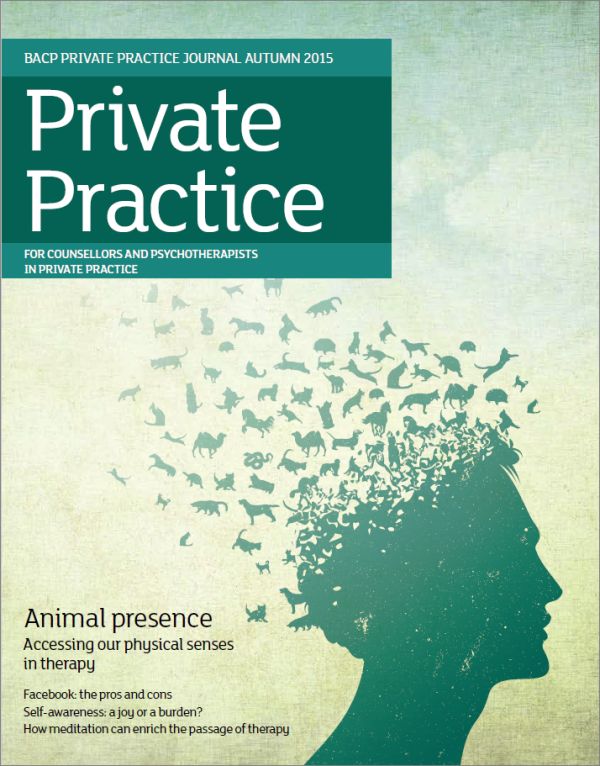In this issue
Features
Debate
Self-awareness: a joy or a burden?
Cordelia Galgut questions the benefit of heightened self-awareness
My perspective
Don’t give up the day job
Karin Brauner on building a private practice while keeping a day job to pay the bills
Ways of working
Being, attending, healing (free article)
Simon Cole argues that meditation can enrich the passage of therapy
My perspective
Animal presence (free article)
Sarah Van Gogh on accessing our animal senses
Regulars

A pdf of this issue is available in the Private Practice archive
Welcome from the editor
Reading Sandra Zecevic-Gonzalez’s review of Self-care for the Mental Health Practitioner by Alfred J Malinowski, I was interested to learn that a national sample of 800 psychologists in the US1 found that of those participants who had been in therapy (the vast majority), 61 per cent had suffered at least one episode of clinical depression, 29 per cent had felt suicidal, and nearly four per cent reported having made a suicide attempt.
This research dates back to 1994 but the findings are substantiated by later surveys, for example Gilroy, Carroll and Murra.2 One possible explanation for the high prevalence of depression and suicidality among therapists is that it has often been our own experience of mental ill health that has led us into the profession in the first place. But perhaps the challenges of the work also lie behind the high levels of emotional and psychological distress. A 2009 APA Colleague Assistance and Wellness Survey3 found that 40–60 per cent of practitioners reported at least a little disruption in professional functioning due to burnout, anxiety or depression, and 18 per cent had had suicidal ideation.
This research is of US origin but my guess is that the findings are likely to extrapolate to the UK. It’s good to see therefore that increased emphasis is placed in the revised Ethical Framework for the Counselling Professions currently in circulation (and due to be implemented on 1 July 2016) on our own self-care and need to address the occupational hazards of our profession. Working as we do – in isolation, often at unsocial hours, and with the additional stressors of sometimes having too few clients to provide sufficient income while having to meet the high outgoings of being in business – it’s particularly important for those of us in private practice to take responsibility for our wellbeing. The Ethical Framework recommends we do this by monitoring our own psychological and physical health, seeking professional support as the need arises, and keeping a healthy balance between our work and other aspects of life.
Two well-documented risks that can result from taking insufficient care of ourselves in our work are secondary traumatic stress and burnout. These issues will be explored in a workshop led by Michael Gavin at the BACP Private Practice conference on trauma, which takes place in London on 19 September. The event is sold out but you still have a unique opportunity to participate by joining the conference online, where Michael’s workshop will be one of two streamed live, along with keynote speeches by PTSD specialist Mark Brayne and leader of the National Association of Chaplains to the Police, Canon David Wilbraham. Online delegates can interact with the keynote speakers and workshop presenters via a chat room and the live webcast will incorporate a studio panel.
Conducting a quick online literature search recently on the subject of therapists’ personal experiences of depression, I drew something of a blank and wondered whether there’s a conspiracy of silence within our ranks around experiences that point to our own vulnerability. My initial response to this is to understand that in a profession that eschews self-disclosure in the service of the client, and that seeks to promote an image of a relationship in which the person who is unwell (the client) consults with the person who is well (the therapist) in pursuit of healing, speaking openly as therapists about our own vulnerabilities might be considered counterproductive. However, I also feel intuitively that it is through our own wounding that we heal – ourselves, in the first instance, and then others – and that it can be salutary in some instances for those who seek our support to know that we are fellow travellers in the lifelong pursuit of self-awareness.
I’m happy there are those who choose not to remain silent; one of whom, Cordelia Galgut, writes candidly about the way in which she feels her own self-awareness, heightened by therapy training and more than 20 years of clinical practice, can impact negatively on her relationships outside her consulting room, and her reactions to life events. In a society that doesn’t value self-reflection in any real way, she asks whether heightened self-awareness can be a burden as much as a joy. The next time someone in a social situation, in response to having asked what I do for a living, says, ‘Are you going to analyse me?’, I will remember Cordelia’s rejoinder: ‘No, actually I’m too busy sorting myself out!’
I want to know what you think in response to Cordelia’s article or any of the topics discussed in this issue or in relation to your work in private practice. Please write to share your opinions.
John Daniel
Editor
privatepractice.editorial@bacp.co.uk
References
1. Pope K, Tabachnick B. Therapists as patients: a national survey of psychologists’ experiences, problems, and beliefs. Professional Psychology: Research and Practice 1994; 25: 247–258.
2. Gilroy P, Carroll L, Murra J. A preliminary survey of counseling psychologists’ personal experiences with depression and treatment. Professional Psychology: Research and Practice 2002; 33: 402–407.
3. American Psychological Association. American Psychological Association survey findings emphasize the importance of self-care for psychologists. American Psychological Association 2010. [Online.] http://www.apapracticecentral.org/update/2010/08-31/survey.aspx (accessed 3 August 2015).
